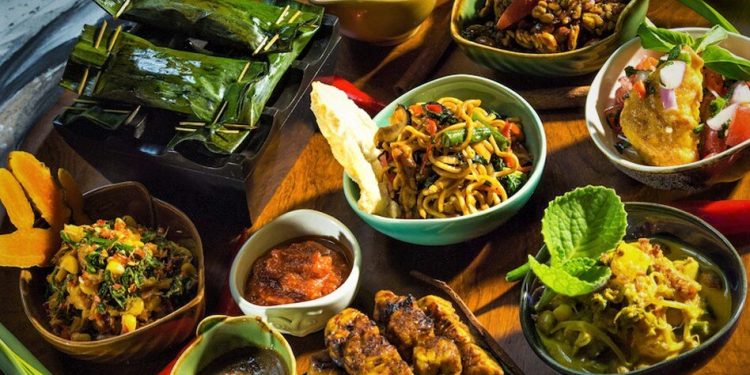
In a land rich with biodiversity and culinary traditions, there exists a vibrant array of meat-free dishes that tantalize the taste buds and nourish the body. This tropical gem showcases an assortment of flavors, colors, and textures that harmoniously come together to create unforgettable meals. Emphasizing fresh ingredients and local herbs, every plate tells a story steeped in culture and warmth.
From bustling markets to charming cafes, food enthusiasts will find a treasure trove of options that cater to those seeking aromatic and wholesome nourishment. Traditional recipes are often reimagined, allowing for a delightful fusion of tastes. Diners will experience a culinary journey that not only satisfies hunger but also promotes sustainability and health.
As you delve into this enticing gastronomic scene, prepare to encounter a symphony of spices and seasonal produce. Each bite invites exploration, revealing a commitment to ethical eating and celebration of nature’s bounty. Join in this flavorful adventure and embark on a quest for innovative and nutritious dishes that truly enchant.
Exploring Traditional Indonesian Vegan Dishes
The richness of culinary heritage offers a plethora of plant-based delights that reflect the diverse landscapes and cultures found across various regions. This exploration highlights the unique flavors and ingredients used in traditional recipes, showcasing how they can cater to those seeking meat-free options without compromising taste or authenticity.
Aromatic Rice Dishes
One of the cornerstones of local fare is rice, often accompanied by an array of vegetables and spices. A popular option is “Nasi Ulam,” a fragrant blend of rice mixed with an assortment of fresh herbs and vegetables, providing a refreshing taste. Another delightful dish is “Nasi Goreng,” which can be easily adapted to include tofu and a medley of colorful veggies, resulting in a satisfying and hearty meal.
Flavorful Soups and Stews
Soups play a vital role in traditional meals, with options like “Soto.” This comforting dish typically features a flavorful broth filled with fragrant herbs and a variety of vegetables suitable for all palates. Additionally, “Gulai,” a spiced coconut milk stew, showcases an array of local vegetables, making it a warm and indulgent choice for those looking to savor rich flavors while remaining plant-based.
Popular Plant-Based Ingredients in Indonesia
A diverse array of natural components forms the backbone of culinary traditions in this vibrant archipelago. These elements not only contribute to flavor but also enhance nutritional value, creating a rich tapestry of tastes and textures. Exploring key factors reveals a world where healthful choices and traditional practices unite harmoniously.
Commonly Used Staples
-
Rice – A fundamental base for many dishes, often enjoyed in various forms.
-
Tempeh – Fermented soybean cake that offers a unique flavor and protein-rich option.
-
Jackfruit – A large fruit used as a meat substitute, praised for its texture.
-
Sweet Potatoes – Frequently used in both savory and sweet dishes, bringing a mild sweetness.
Flavorful Herbs and Spices
-
Galangal – A root that adds a distinct citrus flavor to many recipes.
-
Lemongrass – Known for its refreshing scent and ability to brighten dishes.
-
Curcuma – Often used in traditional recipes, it imparts a vibrant color and health benefits.
-
Coriander – Commonly found in various forms, providing aromatic qualities.
-
Chili Peppers – Essential for imparting heat and invigorating flavors to meals.
Top Vegan Restaurants in Major Cities
In vibrant urban centers across the archipelago, plant-based dining options have flourished, featuring an array of flavors and innovative dishes. Health-conscious eaters and culinary enthusiasts alike can find an enticing selection of establishments that prioritize fresh produce and unique culinary techniques, creating mouthwatering experiences for all palates.
Bali
Renowned for its rich culture and stunning landscapes, Bali offers a plethora of plant-based eateries. Among the highlights is Earth Café, a popular spot known for its organic ingredients and diverse menu ranging from hearty bowls to delicious smoothies. Another gem is Alchemy, celebrated for its raw food offerings and vibrant ambiance, making it a must-visit for anyone seeking nourishing meals infused with flavor.
Jakarta
In the bustling metropolis of Jakarta, health-focused restaurants are increasingly gaining popularity. Vegie Hero stands out with a creative array of dishes that showcase local produce in delightful presentations. Additionally, Plant-Based Heaven provides a cozy environment where diners can indulge in globally inspired cuisine, perfect for those looking to explore new tastes while staying true to their dietary choices.
Unique Regional Vegan Specialties to Try
Each region showcases its distinct flavors and culinary techniques, offering delightful plant-based options that reflect local traditions and ingredients. From spicy to sweet, these dishes highlight the versatility and creativity found in wholesome, earth-friendly meals.
Jewel of Bali: In Bali, one must try Lawar, a traditional mix of finely chopped vegetables, herbs, and spices, often combined with coconut and sometimes tofu or tempeh. This vibrant dish bursts with freshness, embodying the island’s rich agricultural heritage.
Java’s Delight: Head to Java for Oseng-Oseng Tempeh, a stir-fried creation featuring tempeh sautéed with a mélange of local spices and vegetables. This savory and slightly spicy dish offers a perfect introduction to traditional Javanese flavors.
Sumatra’s Specialty: In Sumatra, savor Rendang Tahu, a plant-based version of the famous beef rendang. Made with tofu simmered in a rich coconut milk sauce infused with a blend of aromatic spices, this dish delivers depth and heat, reflecting the region’s bold culinary style.
Maluku Flavor: Experience the rich taste of Papeda from Maluku, a thick sago porridge often served with a side of Kuah Kuning, a turmeric-based soup featuring vegetables and spices. This comforting and satisfying meal is a perfect representation of the archipelago’s diverse ingredients.
Exploring these regional dishes provides insight into the rich tapestry of flavors and practices, showcasing how culture and sustainability intertwine in delightful and delicious ways.
Cultural Influences on Vegan Cuisine
In a region rich with traditions and diverse culinary practices, various cultural elements greatly shape dietary choices and flavor profiles. Historical practices, communal dining habits, and spiritual beliefs play significant roles in determining what ingredients are used and how they are prepared. As a result, plant-based dishes have evolved, reflecting a blend of local customs and global influences.
Religious practices are one of the primary factors influencing dietary preferences, with many communities adhering to vegetarian or plant-based principles. This adherence often stems from deep-rooted beliefs about compassion towards living beings, which directly informs choices around food. Festivals and rituals also contribute, as specialized dishes come to life during celebrations, showcasing the local bounty and the significance of certain ingredients.
Local agriculture plays a vital role in shaping dietary habits as well. Abundant seasonal fruits, vegetables, and grains are not only staples but also inspire innovation in cooking methods and presentation. By embracing these local products, culinary artisans create rich and diverse offerings that highlight the essence of their heritage.
Additionally, globalization has introduced new ideas and recipes into local kitchens, resulting in a fascinating fusion of flavors. Chefs and home cooks alike experiment with incorporating international elements, transforming traditional meals and making them more accessible to a wider audience. As a consequence, what emerges is a vibrant tapestry of plant-based dishes that celebrate both cultural legacy and modern innovation.
Tips for Finding Vegan Food While Traveling
Exploring new destinations offers a wonderful opportunity to indulge in local flavors and dishes. For those adhering to plant-based diets, discovering suitable meal options can sometimes pose a challenge. With a bit of preparation and awareness, finding satisfying and nutritious food is entirely achievable during your journeys.
Utilize Online Resources
Before embarking on your adventure, take advantage of various online platforms dedicated to listing food spots that cater to plant-based eaters. Websites and mobile applications provide extensive reviews, menus, and photos, helping you identify suitable restaurants and cafes in your chosen location. Engaging with fellow travelers in forums and social media groups can also yield valuable tips and recommendations.
Learn Key Phrases
Familiarizing yourself with essential phrases in the local language can greatly assist in navigating menus and communicating dietary preferences. Understanding terms related to restrictions can help you avoid unwanted ingredients. Carrying a translation app or a printed list of key phrases can foster better interactions with restaurant staff and enhance your dining experience.
Q&A: Vegan Indonesia
What are some must-try vegan dishes in Indonesian cuisine?
Indonesian cuisine offers a delightful variety of vegan dishes that are rich in flavor and texture. Some must-try options include ‘Nasi Goreng’ (fried rice often made with vegetables and soy sauce), ‘Gado-Gado’ (a salad of boiled vegetables served with peanut sauce), and ‘Tempeh’ which is a fermented soybean product that is both nutritious and delicious. Another favorite is ‘Soto’ (a traditional soup) made with vegetable broth and a plethora of herbs, providing a fragrant and hearty meal. End your meal with ‘Es Campur’ (mixed ice dessert) made from fruits and sweet syrup, perfect for a refreshing treat!
Are there specific restaurants in Indonesia known for their vegan offerings?
Absolutely! Indonesia has embraced the vegan movement, particularly in cities like Bali and Jakarta. In Bali, ‘Earth Cafe’ is famous for its extensive vegan menu including smoothies, salads, and raw desserts. ‘Alkaline Vegan’ in Ubud offers a creative twist on traditional Indonesian dishes, all plant-based. In Jakarta, ‘Hkind’ is popular for its vegan burgers and comfort food. Many restaurants also incorporate local ingredients, ensuring a unique dining experience that reflects the region’s rich culinary heritage. Online reviews and local guides can help you discover hidden gems as well!
Is it easy to find vegan food in rural areas of Indonesia?
Finding vegan food in rural parts of Indonesia can be a bit challenging compared to urban centers. However, traditional Indonesian cuisine often features a variety of plant-based ingredients. Dishes like ‘Sayur Lodeh’ (vegetable stew) and ‘Urap’ (vegetables mixed with grated coconut) can be found in local eateries. Communicating your dietary preferences can be important, as some dishes may traditionally contain animal products. Learning a few key phrases in Bahasa Indonesia related to veganism can help you navigate menus and market stalls more easily, ensuring a fulfilling culinary experience even in less touristy areas.
How does Indonesian vegan cuisine compare to other Southeast Asian cuisines?
Indonesian vegan cuisine is unique yet shares similarities with other Southeast Asian cuisines, such as those in Malaysia, Thailand, and Vietnam. Like its neighbors, Indonesia utilizes a wealth of fresh vegetables, herbs, and spices, contributing to vibrant and diverse flavors. However, Indonesian cuisine often features rice as a staple, alongside tempeh and tofu as primary protein sources. While Thai dishes may lean heavily on coconut milk and spices, Indonesian offerings may highlight soy-based ingredients and traditional sauces like kecap manis (sweet soy sauce). Each country’s culinary traditions reflect its cultural influences, resulting in a rich tapestry of flavors across the region.
What are some tips for traveling in Indonesia as a vegan?
Traveling in Indonesia as a vegan can be a rewarding experience with some planning. Here are a few tips: First, research restaurants that cater to vegan diets in the areas you’ll be visiting. Apps like HappyCow can be incredibly helpful. It’s also wise to learn a few phrases in Bahasa Indonesia to communicate your dietary restrictions clearly; for example, saying “saya vegan” (I am vegan) can go a long way. Carrying snacks like nuts or fruit can be useful for longer journeys, especially in remote areas. Additionally, be open to trying new local dishes made with vegetables, rice, and herbs, as many traditional meals can be easily modified. With a bit of effort, you’ll discover an array of delicious vegan options throughout Indonesia!
What are some of the best vegan-friendly dishes to try in Indonesia?
Some of the best vegan-friendly dishes to try in Indonesia include gado-gado, a traditional Indonesian salad made with tofu, tempeh, vegetables, and a peanut sauce. Other vegan-friendly options are sayur, a vegetable curry often made with coconut milk, and vegetable salad with bean sprouts. For those seeking a sweet treat, coconut sugar and palm sugar are commonly used in Indonesian desserts.
How can someone follow a vegan lifestyle while traveling in Indonesia?
Traveling in Indonesia while following a vegan lifestyle can be managed by seeking out vegan and vegetarian restaurants and food stalls in major cities like Yogyakarta and Jakarta. Vegan-friendly restaurants and cafes often offer plant-based food, including tofu and tempeh dishes. It’s also helpful to be aware of local ingredients, avoiding shrimp paste and fish sauce, and opting for coconut sugar and vegetable-based dishes.
What are the challenges of being vegan in Indonesia, and how can they be overcome?
One challenge of being vegan in Indonesia is the frequent use of animal products like shrimp paste and fish sauce in traditional dishes. To overcome this, it’s essential to seek out vegetarian and vegan options at restaurants and food stalls. Learning about local ingredients, such as palm sugar and coconut sugar, and communicating dietary preferences clearly can help ensure that food is vegan-friendly. Engaging with the vegan community in Indonesia can also provide valuable tips and recommendations.
How does Indonesia’s vegan community contribute to the availability of plant-based food options?
Indonesia’s vegan community plays a significant role in increasing the availability of plant-based food options. By advocating for vegan-friendly practices and supporting vegan and vegetarian restaurants, they help expand the variety of vegan products and dishes. This community also contributes by sharing resources such as vegan guides, travel tips, and local food recommendations, making it easier for others to find vegan-friendly places.
What are some travel tips for vegans visiting Indonesia for the first time?
For vegans visiting Indonesia for the first time, it’s beneficial to research and list vegan-friendly restaurants and cafes in advance. Familiarize yourself with local ingredients and dishes that are naturally vegan, such as gado-gado, tofu, tempeh, and vegetable curries. Learn to ask for modifications to avoid non-vegan ingredients like shrimp paste and fish sauce. Engaging with the local vegan community and using vegan guides can also enhance your dining experience while traveling.




